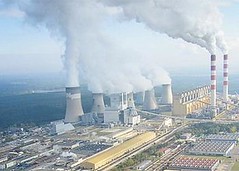歐洲最髒30名電廠阻礙氣候改革進程
Category: 水新聞 Created: Thursday, 24 July 2014 08:32歐洲五大環團代表數百個較小民間組織、數百萬位公民發表最新「歐洲最髒30名」報告,指出歐洲的火力發電廠正阻礙氣候改革的進程。而其中,德國和英國並列污染最嚴重國家,各有9個最髒的電廠。
 報告中列出最髒的電廠是波蘭的Bełchatów電廠,歐洲最大火力電廠、全世界第四大。這座發電量5,053兆瓦的褐煤燃料電廠位於波蘭中南部Bełchatów附近,由PGE Elektrownia Bełchatów S.A公司所有及營運,發電量為波蘭總發電量的20%。
報告中列出最髒的電廠是波蘭的Bełchatów電廠,歐洲最大火力電廠、全世界第四大。這座發電量5,053兆瓦的褐煤燃料電廠位於波蘭中南部Bełchatów附近,由PGE Elektrownia Bełchatów S.A公司所有及營運,發電量為波蘭總發電量的20%。
「歐洲最髒30名」報告首次發表於2007年,今年由歐洲氣候行動網絡、德國氣候聯盟、歐洲環境局、健康環境聯盟和全球保育組織世界自然基金會(WWF)共同出版。
報告共同作者、歐洲氣候行動網絡燃煤政策主任Kathrin Gutmann說,「燃煤電廠全球最大單一溫室氣體排放源。如歐洲最髒30名電廠報告中顯示,歐盟二氧化碳排放來自燃煤的比例仍太高。歐盟若要達成自己的長期氣候目標,就需要立即解決燃煤問題。」
報告指出,歐盟的燃煤問題來自現存燃煤電廠使用的增加而非新電廠的增加。由於燃煤價格比天然氣便宜,許多歐盟燃煤電廠目前都滿載運作。
因此,儘管再生能源快速發展以及全歐盟整體溫室氣體排放下降,燃煤電廠佔全歐二氧化碳排放的比例仍然升高。
一些人口最多的歐盟成員國大量使用燃煤,如英國和德國,讓歐盟難以將燃煤從二氧化碳排放中淘汰,阻礙了歐盟氣候改革的腳步。
根據國際能源署的氣候變遷情境模擬,歐盟燃煤發電佔總發電比例必須在2035年達到4%以下,跟2011年的26%仍有相當的差距,需要大幅縮減。
WWF歐洲政策辦公室能源政策主任Darek Urbaniak說,「歐盟需要終結對燃煤的依賴,必須設定三個具野心的減排、增加能源效率和再生能源目標。歐盟排放交易系統需要結構性的改革,電廠需要二氧化碳排放的績效標準,以擺脫對最髒電廠的依賴。」
Carbon emissions from coal-burning power plants in the EU are undermining climate efforts, warns the latest “Europe’s Dirty 30″ report, released today by five large European environmental groups, representing millions of citizens in hundreds of smaller organizations.
Germany and the UK tie for top polluting country, with nine of the dirtiest coal plants each, finds the report.
By far the dirtiest of the 30 power plants named in the report is Poland’s Bełchatów power plant, the largest thermal power station in Europe, fourth largest in the world. The 5,053 megawatt lignite-fired power plant is situated near Bełchatów in south-central Poland. Owned and operated by PGE Elektrownia Bełchatów S.A., it produces 20 percent of Poland’s total power generation.
This year’s “Europe’s Dirty 30″ report was published jointly by: Climate Action Network Europe, Climate Alliance Germany, the European Environmental Bureau, the Health and Environment Alliance and the global conservation organization WWF, which started this series of reports in 2007.
Co-author Kathrin Gutmann, coal policy officer at Climate Action Network Europe, said, “Coal-fired power plants are the single biggest global source of greenhouse gas emissions. CO2 emissions from coal in the EU are still far too high, as shown by the EU’s ‘Dirty 30 power plants.’ The EU needs to tackle coal head on, if it wants to successfully meet its own long-term climate targets.”
The EU’s coal problem, the report shows, is caused by the increased use of existing coal assets rather than a net increase in the number of coal plants. Many of the EU’s coal-fired plants are now running at or near full capacity, due to the relatively low price of coal compared to gas.
This has led to an increase in CO2 emissions from coal power plants across Europe, despite the rapid expansion of renewables and an overall decrease in total EU greenhouse gas emissions.
The heavy use of coal in some of the EU Member States with the highest populations, such as the UK and Germany, puts the EU in grave danger of not phasing out emissions from coal quickly enough, undermining the EU’s climate ambitions.
According to climate scenarios by the International Energy Agency, the share of coal in electricity generation in the EU must be below four percent by 2035. This will require a sharp decrease compared to coal’s 26 percent share of electricity generation in 2011.
Darek Urbaniak, energy policy officer at WWF European Policy Office, said, “What the EU needs to end its coal addiction are three ambitious targets to cut greenhouse gases, and boost energy efficiency and renewable energy. A structural reform of the ailing EU ETS [Emissions Trading System] as well as the introduction of an Emissions Performance Standard for CO2 emissions from the power sector are also key in order to prevent lock-in of the most-polluting power infrastructure,” he said.
※ 全文及圖片詳見:ENS
Read more http://e-info.org.tw/node/100926








